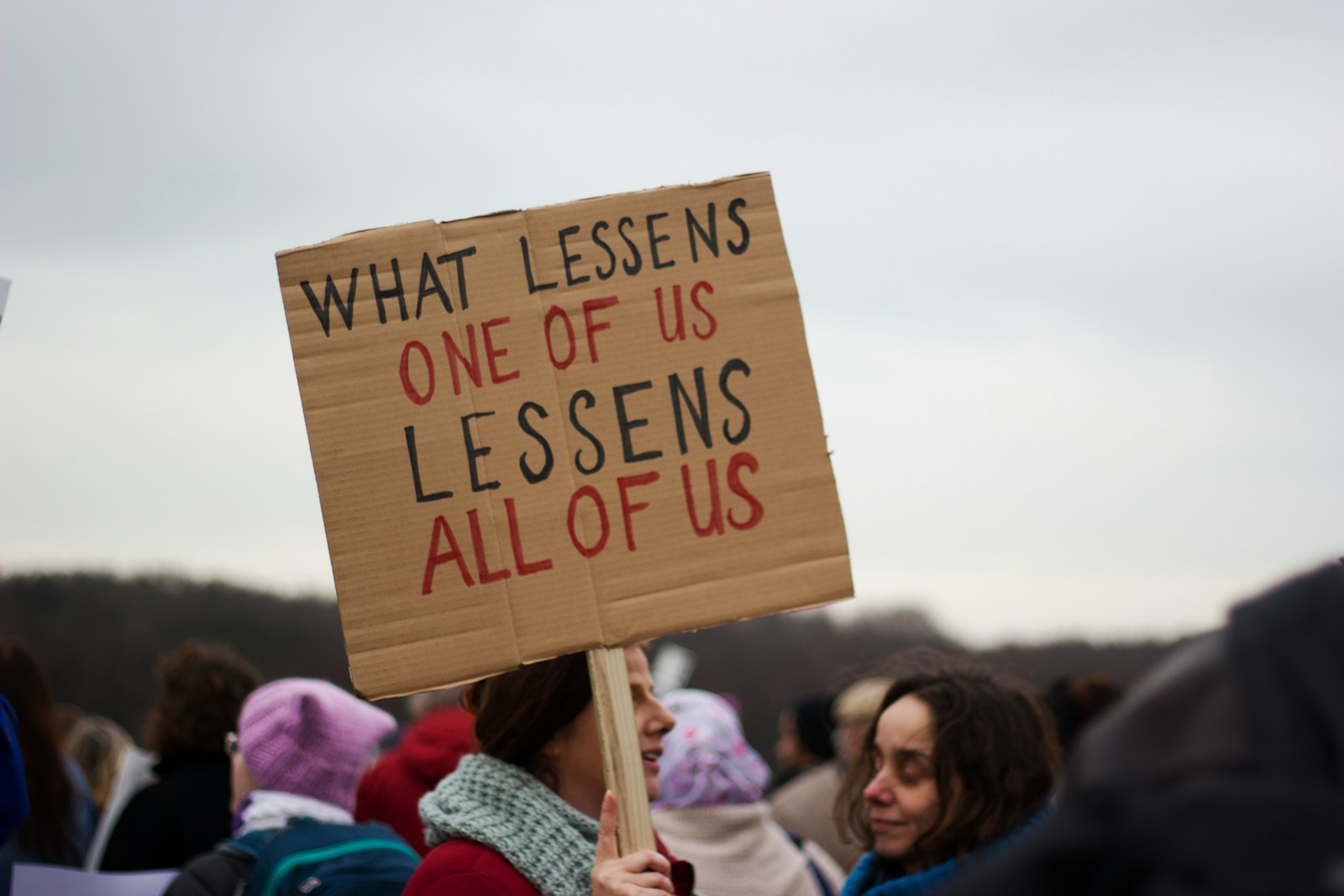
Photograph by Micheile Henderson via Unsplash
Cruelty is coming. Brush up on nonviolent resistance
On July 31, 2018, the Senate Judiciary Committee held a hearing on the separation of families at the border during the first Trump administration. At one point during the hearing, Senator Sheldon Whitehouse went down the line of the five government officials at the table and asked them all, “What went wrong?” Four of the five gave the usual convoluted answers that mostly just restated what their job is.
But Commander Jonathan White of the Department of Health and Human Services gave a forthright answer that was so succinct, it was easy to miss: “What went wrong is that children were separated from their parents and referred as unaccompanied alien children when, in fact, they were accompanied.”
With that 6-second clip that was largely missed by the media and the American public, Commander White told us the practical “how” of this heinous thing that was done to desperate families and innocent children. Having fled unlivable conditions in their home countries, families arrived to turn themselves over to officials and ask for asylum (which is a legal method of immigration) only to have U.S. officials kidnap thousands of children (over 5,000 children between January 2017 and June 2018 alone) from their guardians and enter into the system that the children came alone.
ProPublica published audio from some of the detention centers, where you could not only hear the cries of children but the taunts of border patrol agents. The cruelty was the point, it still is the point, and those who have used dehumanizing, Nazi-like language to describe immigrants (vermin, poisoning the blood of our country, etc.) have now been given power again.
A popular sign at Trump’s campaign rallies in 2024 said “Mass Deportation Now.” Although some try to suggest that this is only about deporting undocumented individuals who have committed crimes, it is clearly rooted in a generalized xenophobia, illustrated by everything from family separation to attempts to end DACA protections to bans on people from certain countries just because they are majority Muslim. Never mind the president-elect’s calls to end birthright citizenship (a move that, if somehow accomplished, would leave hundreds of thousands of children per year stateless). Never mind former Immigration and Customs Enforcement (ICE) director, Thomas Homan, the man tapped to be border czar, calling for “shock and awe,” saying that “families can be deported together” even if some are citizens. This rhetoric is belied by the reality that undocumented immigrants commit crimes at lower rates than citizens do and contribute taxes to a system from which they likely will not benefit.
Don’t think that it’s just those within a particular extreme circle, either. Otherwise mainstream lawmakers like Senator Marco Rubio have supported calls for visa revocation based on ideology, for example for people seen as anti-Israel.
Nonviolent resistance is about peacefully but decidedly disrupting oppressive tactics. Although it sometimes puts the person engaged in it at risk of things like arrest or violence themselves, when done well, it uses creativity, self-sacrifice, and solidarity to affirm the humanity of the vulnerable.
In my lifetime, I don’t think I’ve seen such a large and prominent group of people be so gleeful and excited about inflicting pain and suffering. This is not an issue of right vs. left. This is right vs. wrong. I, for one, believe in the value of having robust political debate and policymaking with conservatives, moderates, and liberals all at the table. Our immigration system is broken and communities responding to the needs of large numbers of migrants are rightly frustrated. Several bipartisan reform bills have been put forward in recent decades, including just this year, but none have passed because anger over immigration helps elected officials keep their seats much more effectively than practical solutions.
So, as it stands, we are on the precipice of a torrent of cruelty and inhumane treatment of vulnerable communities, especially immigrants, with far fewer reasonable people and judicial guardrails in place than the first time around. When you have organizations planning for the worst, like universities urging their students to be on American soil by inauguration day, it’s time to do more than just pay attention.
Cruelty will have the support of an uncomfortably large number of Americans. Douglas Avilesbernal, the Executive Minister of the Evergreen Association of American Baptist Churches, posted on Facebook[i] about his visits to certain online communities, and his main takeaway is sobering: “We must organize as there are several million who would have no problem with concentration camps, racist laws and the like.” Armed white nationalist terrorists, which the media insists on legitimizing with the name “militia,” are chomping at the bit to come alongside the government in rounding people up.
I wish I could say that we have multiple good options for stopping what’s coming. We do not. But we can and must be prepared to use one powerful tool we will still have. It is one that has been at the root of much progress: nonviolent resistance. It’s time to brush up on it.
William H. Lamar IV, the pastor of a Washington, D.C. church that was vandalized by white nationalists, wrote that Christians must stop being “agents of ecclesiological, institutional and theological sentimentality. Too often, people leave worship feeling close to God and good about their neighbors but unmoved to disrupt the visible oppression outside their sanctuaries.”
Nonviolent resistance is about peacefully but decidedly disrupting oppressive tactics. Although it sometimes puts the person engaged in it at risk of things like arrest or violence themselves, when done well, it uses creativity, self-sacrifice, and solidarity to affirm the humanity of the vulnerable.
Nonviolent resistance is basically people of faith saying, “You will have to go through me,” or “I will put myself on the line in some way for the sake of those with less power or voice.” I call on not just everyday people of faith but religious leaders and denominational heads to help point the way. This is our work at this time.
Nonviolent resistance is present in a well-known teaching from Jesus, but it hides in plain sight. When he tells his listeners living under Roman occupation to turn the other cheek, give over their cloak, and go the extra mile (Matt. 5:38-42), they are not the invitations to be a doormat that they can sound to modern ears. Cultural and religious context reveals these teachings to be creative ways to affirm one’s own human dignity and expose the powerful for kicking people when they’re down.
Nonviolent resistance is basically people of faith saying, “You will have to go through me,” or “I will put myself on the line in some way for the sake of those with less power or voice.” Dietrich Bonhoeffer wrote in a letter dated July 18, 1944 that we are called to “participation in the sufferings of God” at the hands of “the godless world.” When he calls the world “godless,” anyone who knows Bonhoeffer’s context knows he is not talking about the petty personal vices that preoccupy some Christians. It was about systemic evil carried out by political forces.
I wish I could say exactly how this will look and what will be most effective in your community, but there is much for you to discern based on your context. Dr. Gene Sharp and his Albert Einstein Institution have researched and compiled as many as 198 methods of nonviolent resistance (a few of which I would not endorse). It can include anything from boycotts and demonstrations to physically getting in the way of an imminent act of cruelty. Although I have highlighted the threat to immigrants here as what I believe will be the most widespread and pronounced oppression, this can and should be applied to many other groups who face dehumanization and disregard in the coming years.
As Martin Luther King and other civil rights leaders well knew, nonviolent resistance can feel very futile in the moment. Neither for them, nor for us now, will it immediately “work” to stop every isolated instance of oppression and violence. But if we each do our part and persevere, our collective bravery and voice for justice can eventually bear fruit. The prophets knew this. Isaiah, in the middle of articulating a vision for shalom and human flourishing, said that God’s word will not return empty and will eventually be accomplished (Isa. 55:10-11).
Erica Chenoweth, a political scientist at Harvard University, collected data demonstrating not only that nonviolent resistance is quite effective, but that it only takes 3.5% of a population actively participating to ensure serious political change…or stop atrocities before they occur.
I know that many of us are already tired and discouraged but, especially now, we must not be found among the idle. Pray. Communicate and organize in your communities. Read about MLK and others. Brush up on nonviolent resistance. Biblical exhortations for the compassionate and merciful treatment of immigrants are many, most notably the injunction to treat them as if they are native born and to love them as ourselves (Leviticus 19:34.) I call on not just everyday people of faith but religious leaders and denominational heads to help point the way. This is our work at this time.
Rev. Dr. Corey Fields is senior pastor of Calvary Baptist Church, Newark, Delaware.
The views expressed are those of the author and not necessarily those of American Baptist Home Mission Societies.
[i] The post was private; the Christian Citizen has verified it and the author’s permission to quote it.



